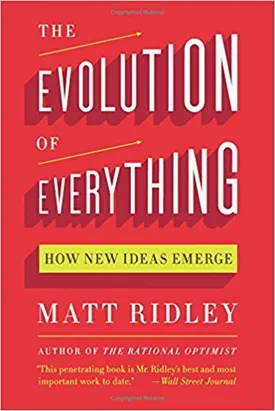The Evolution of Everything: How New Ideas Emerge by Matt Ridley
The Evolution of Everything: How New Ideas Emerge, by Matt Ridley is a fascinating read that explores the mechanisms and patterns of change in the world around us. In this insightful book, Ridley dives into the scientific insights, numerous case studies, and deep research that he conducted over the past two decades to examine the evolution of ideas and how they shape our lives. From the smallest facets of daily life (such as the technologies related to our phones, computers, and the Internet) to grand-scale events (in business, science, and economics), the book offers comprehensive explanations and eye-opening examples.
In the first section of The Evolution of Everything, Ridley looks at the different ways in which ideas evolve. He draws from several different fields, from biology and economics to technology and sociology, to illustrate how ideas emerge and spread. Ridley argues that the process of evolution is never-ending and can take place at multiple levels—from the individual to the group, from the small scale to the global. As he states, “evolution is all about the slow, incremental, and almost imperceptible blending and remaking of old elements into new creations.”
In the second section, The Evolution of Everything takes a closer look at various aspects of our lives and examines how the process of evolution shapes them. Here, Ridley delves into topics such as the Internet revolution, business, and the global economy. He explores the ways in which ideas, technologies, and institutions evolve and how they can impact our lives. Furthermore, Ridley also looks at the role of complexity in our lives and how it has made different domains of knowledge more interconnected than ever before.
In the third section of his book, Ridley examines the various theories of evolution and how they are applied in various contexts. He looks at the work of different scholars, such as Richard Dawkins, and how their ideas can be used to analyse the evolution of different systems. Ridley also explores how the theories of evolution can be used to explain how different species adapt to changing conditions and how the process of natural selection works.
The fourth section of The Evolution of Everything focuses on the implications of evolution for society and for individuals. Here, Ridley discusses the common misperceptions about evolution and how it affects our lives. He also examines the role of racism, sexism, and other forms of discrimination in our society and how our views of evolution shape these phenomena.
The book is a comprehensive overview of the evolution of ideas, their implications, and their recommendations. It is a must-read for those interested in understanding how changes occur and how the process of evolution applies to various aspects of our lives. By delving into various topics and drawing on numerous research and case studies, Ridley provides readers with an insightful look at the mechanisms of evolution and how they can be employed to improve our lives.

